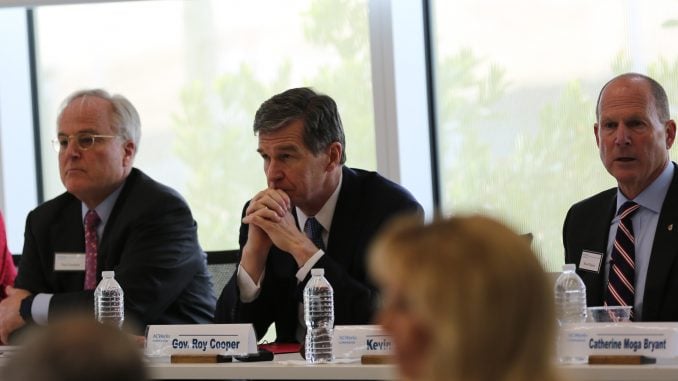
RALEIGH — Gov. Roy Cooper announced Wednesday that he will let a bill become law that redirects a $57.8 million environmental mitigation fund to public school systems in the eight counties affected by the Atlantic Coast Pipeline.
The money comes from the owners of the Atlantic Coast Pipeline and has been a point of controversy since its announcement last week, a day before Cooper’s Department of Environmental Quality issued necessary permits to allow the pipeline project to move forward. Critical lawmakers have called it a “slush fund” for Cooper and sent it to the counties hosting the pipeline instead.
“This charade has to stop, using our kids and now our schools, as tools for their power grab and their partisan attacks is pretty low, even for them,” Cooper said in a press conference at the Executive Mansion Wednesday.
House Bill 90 passed the legislature during a special session this week, winning the House 104-12. During a committee hearing last week, lawmakers from both parties raised questions about the process of the fund’s creation, along with its management and why it bypassed the normal budget process for funds coming into state government. Lawmakers sent their questions to the governor’s new legislative director, Lee Lilley, with answers due back on Thursday afternoon.
“Gov. Cooper’s deal looks like a payment-for-permit and doesn’t pass the smell test, and the right thing to do is to take this ‘voluntary contribution’ to the state and use it to fund the educational needs of children in the poor, rural communities impacted by the Atlantic Coast Pipeline,” read a statement from Senate Majority Leader Harry Brown (R-Onslow), chair of the Senate Appropriations/Base Budget Committee after the meeting.
Cooper’s anger was visible as he spoke to media on Wednesday. While he supported parts of the bill that phased in class size reductions and elimination of the low-income pre-K waiting list, he accused lawmakers of “manufacturing” a power struggle and putting at risk nearly $58 million from Duke Energy and Dominion Energy. The environmental mitigation fund was announced by Cooper in a memo of understanding last week and was to be administered by a board that Cooper appointed for environmental projects, economic development and for promotion of renewable energy. Cooper had also faced strong criticism and protests from environmental groups who opposed his administration’s approval of the pipeline permits.
“The legislature has imperiled an agreement with the Atlantic Coast Pipeline to invest in economic development and environmental protections in eastern N.C. instead the legislators manufactured a power struggle about a pipeline that they said they wanted,” said Cooper. “They raided the money that was supposed to bring jobs and lessen the environmental impact for the very communities that were affected.”
“It’s clear that he got his hand caught in the cookie jar and he is doing eveything he can do to twist and turn and come up with an explanation that he hopes will stick,” said Berger in a WTVD television interview Wednesday evening.
Despite the conflict, there was common ground. The new law phases in the 2015 mandatory reductions in K-3 class size and provides $60 million for schools to hire additional special subject teachers for instruction in P.E., art, music and others. Those problems with the class-size reduction mandates became apparent when school administrators told lawmakers that the state allotment for classroom teachers and “specials” teachers was one number, and one funding stream, since the 1990s and consequently schools had been using that as flexibility to hire more specialty teachers. It meant that now, with the class-size reductions, they would have to eliminate some specials teachers that enhance their education programs. The new law provides money to keep and hire those specials teachers without touching the money already allotted to hire more K-3 classroom teachers. It would still give local schools more control
“We made a very simple flexibility rule,” said bill sponsor Sen. Chad Barefoot (R-Wake). “Classroom teacher allotment must be spent on classroom teachers, the new program enhancement teacher allotment can be spent on program enhancement teachers, or it can also be spent on classroom teachers.”
Rep. Craig Horn (R- Union) and Sen. Chad Barefoot (R-Wake), chairs of the House and Senate Education Committees, sponsored H.B. 90, which has the support of the N.C. Association of School Administrators. Their executive director spoke at the press conference announcing the bill last week.
“On behalf of the school superintendents in our membership we are very pleased to support this reasonable timeline for K-3 class-size reductions, and for the funding for vitally important funding in art, music, physical education and world languages,” said Katherine Joyce, executive director of the N.C. Association of School Administrators. “We especially appreciate that the house and Senate leaders worked closely with us on developing this viable solution.”
The bill also funds the entire waiting list for low-income families waiting for a spot in N.C. pre-K. Cooper spoke positively of the move, but also stepped it up — calling for more money for school construction and universal pre-K.
“They have eliminated the waiting list for pre-K, and we know quality pre-K works. Making sure children are healthy and ready to learn by the time they go to kindergarten leads to success in school and the workforce,” said Cooper. “Now we need to add even more quality pre-K spots so that ANY family who wants their child to learn early will have somewhere to go.”



